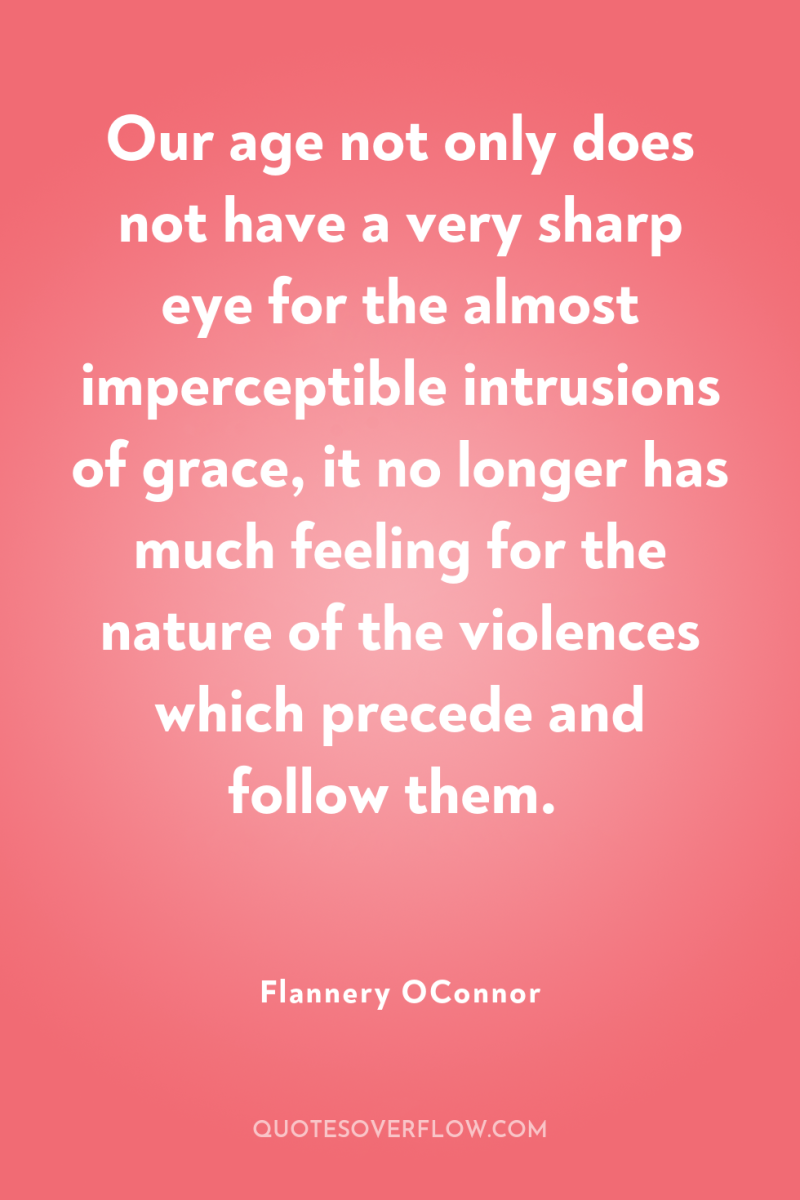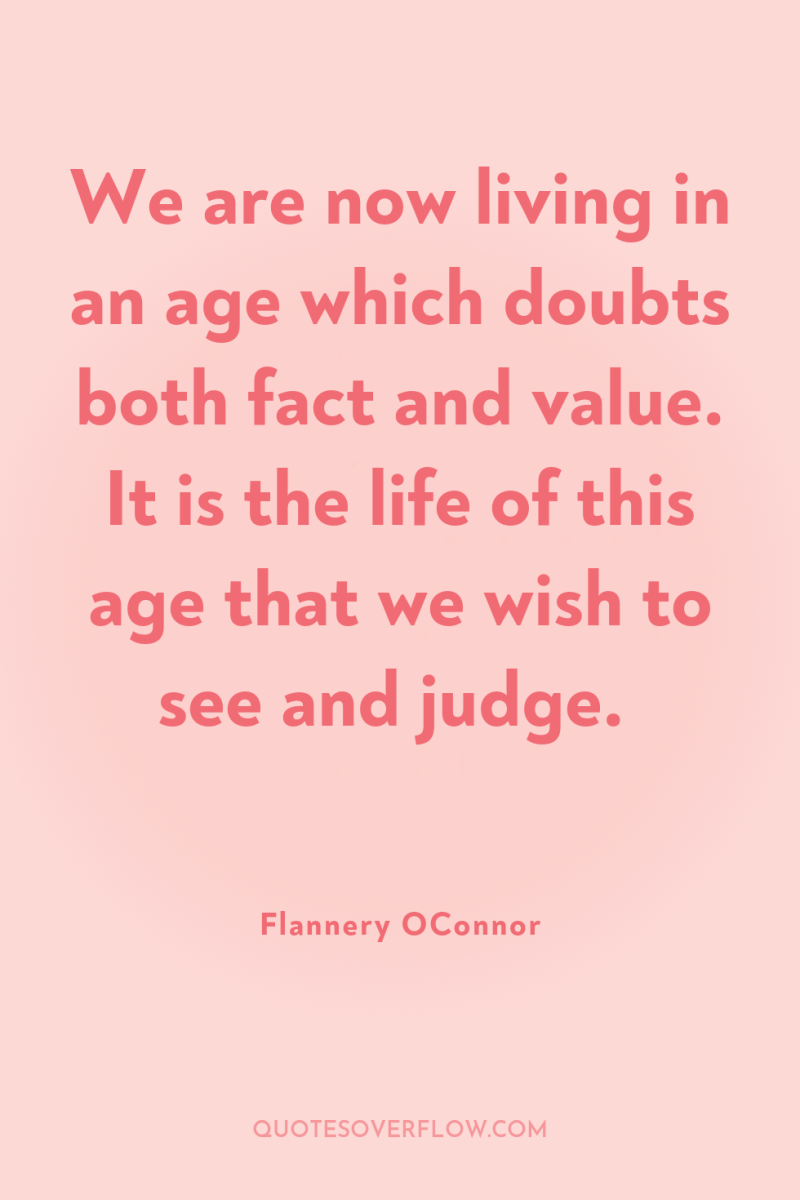
1
Anybody who has survived his childhood has enough information about life to last him the rest of his days.Flannery OConnor

2
When there is a tendency to compartmentalize the spiritual and make it resident in a certain type of life only, the spiritual is apt gradually to be lost.Flannery OConnor
3
We live in an unbelieving age but one which is markedly and lopsidedly spiritual. There is one type of modern man who recognizes spirit in himself but who fails to recognize a being outside himself whom he can adore as Creator and Lord; consequently he has become his own ultimate concern. He says with Swinburne, "Glory to man in the highest, for he is the master of things, " or with Steinbeck, "In the end was the word and the word was with men." For him, man has his own natural spirit of courage and dignity and pride and must consider it a point of honor to be satisfied with this. There is another type of modern man who recognizes a divine being not himself, but who does not believe that this being can be known anagogically or defined dogmatically or received sacramentally. Spirit and matter are separated for him. Man wanders about, caught in a maze of guilt he can't identify, trying to reach a God he can't approach, a God powerless to approach him. And there is another type of modern man who can neither believe nor contain himself in unbelief and who searches desperately, feeling about in all experience for the lost God. .Flannery OConnor
4
It is when the individual's faith is weak, not strong, that he will be afraid of an honest fictional representation of life; and when there is a tendency to compartmentalize the spiritual and make it resident in a certain type of life only, the supernatural is apt gradually to be lost.Flannery OConnor
5
Writing a novel is a terrible experience, during which the hair often falls out and the teeth decay. I'm always irritated by people who imply that writing fiction is an escape from reality. It is a plunge into reality and it's very shocking to the system.Flannery OConnor
6
There is something in us, as storytellers and as listeners to stories, that demands the redemptive act, that demands that what falls at least be offered the chance to be restored. The reader of today looks for this motion, and rightly so, but what he has forgotten is the cost of it. His sense of evil is diluted or lacking altogether, and so he has forgotten the price of restoration. When he reads a novel, he wants either his sense tormented or his spirits raised. He wants to be transported, instantly, either to mock damnation or a mock innocence.Flannery OConnor

7
Our age not only does not have a very sharp eye for the almost imperceptible intrusions of grace, it no longer has much feeling for the nature of the violences which precede and follow them.Flannery OConnor
8
There is no excuse for anyone to write fiction for public consumption unless he has been called to do so by the presence of a gift. It is the nature of fiction not to be good for much unless it is good in itself.Flannery OConnor
9
I have found, in short, from reading my own writing, that my subject in fiction is the action of grace in territory largely held by the devil. I have also found that what I write is read by an audience which puts little stock either in grace or the devil. You discover your audience at the same time and in the same way that you discover your subject, but it is an added blow.Flannery OConnor

10
We are now living in an age which doubts both fact and value. It is the life of this age that we wish to see and judge.Flannery OConnor

11
Your beliefs will be the light by which you see, but they will not be what you see and they will not be a substitute for seeing.Flannery OConnor
12
I don't know which is worse–to have a bad teacher or no teacher at all. In any case, I believe the teacher's work should be largely negative. He can't put the gift into you, but if he finds it there, he can try to keep it from going in an obviously wrong direction. We can learn how not to write, but this is a discipline that does not simply concern writing itself but concerns the whole intellectual life. A mind cleared of false emotion and false sentiment and egocentricity is going to have at least those roadblocks removed from its path. If you don't think cheaply, then there at least won't be the quality of cheapness in your writing, even though you may not be able to write well. The teacher can try to weed out what is positively bad, and this should be the aim of the whole college. Any discipline can help your writing: logic, mathematics, theology, and of course and particularly drawing. Anything that helps you to see, anything that makes you look. The writer should never be ashamed of staring. There is nothing that doesn't require his attention.Flannery OConnor
13
I don't recall that when I was in high school or college, any novel was ever presented to me to study as a novel. In fact, I was well on the way to getting a Master's degree in English before I really knew what fiction was, and I doubt if I would ever have learned then, had I not been trying to write it. I believe that it's perfectly possible to run a course of academic degrees in English and to emerge a seemingly respectable Ph.D. and still not know how to read fiction. .Flannery OConnor
14
The sorry religious novel comes about when the writer supposes that because of his belief, he is somehow dispensed from the obligation to penetrate concrete reality. He will think that the eyes of the Church or of the Bible or of his particular theology have already done the seeing for him, and that his business is to rearrange this essential vision into satisfying patterns, getting himself as little dirty in the process as possible.Flannery OConnor
15
The writer has no rights at all except those he forges for himself inside his own work. We have become so flooded with sorry fiction based on unearned liberties, or on the notion that fiction must represent the typical, that in the public mind the deeper kinds of realism are less and less understandable.Flannery OConnor
16
The fiction writer is an observer, first, last, and always, but he cannot be an adequate observer unless he is free from uncertainty about what he sees. Those who have no absolute values cannot let the relative remain merely relative; they are always raising it to the level of the absolute. The Catholic fiction writer is entirely free to observe. He feels no call to take on the duties of God or to create a new universe. He feels perfectly free to look at the one we already have and to show exactly what he sees.Flannery OConnor
17
You may ask, why not simply call this literature Christian? Unfortunately, the word Christian is no longer reliable. It has come to mean anyone with a golden heart. And a golden heart would be a positive interference in the writing of fiction.Flannery OConnor
18
It is generally supposed, and not least by Catholics, that the Catholic who writes fiction is out to use fiction to prove the truth of the Faith, or at the least, to prove the existence of the supernatural. He may be. No one certainly can be sure of his low motives except as they suggest themselves in his finished work, but when the finished work suggests that pertinent actions have been fraudulently manipulated or overlooked or smothered, whatever purposes the writer started out with have already been defeated. What the fiction writer will discover, if he discovers anything at all, is that he himself cannot move or mold reality in the interests of an abstract truth. The writer learns, perhaps more quickly than the reader, to be humble in the face of what-is. What-is is all he has to do with; the concrete is his medium; and he will realize eventually that fiction can transcend its limitations only by staying within them.Flannery OConnor
19
The type of mind that can understand good fiction is not necessarily the educated mind, but it is at all times the kind of mind that is willing to have its sense of mystery deepened by contact with reality, and its sense of reality depend by contact with mystery. Fiction should be both canny and uncanny. In a good deal of popular criticism, there is the notion operating that all fiction has to be about the Average Man, and has to depict average ordinary everyday life, that every fiction writer must produce what used to be called "a slice of life." But if life, in that sense, satisfied us, there would be no sense in producing literature at all.Flannery OConnor
20
I'll call any length of fiction a story, whether it be a novel or a shorter piece, and I'll call anything a story in which specific characters and events influence each other to form a meaningful narrative. I find that most people know what a story is until they sit down to write one. Then they find themselves writing a sketch with an essay woven through it, or an essay with a sketch woven through it, or an editorial with a character in it, or a case history with a moral, or some other mongrel thing. When they realize that they aren't writing stories, they decide that the remedy for this is to learn something that they refer to as "the technique of the short story" or "the technique of the novel." Technique in the minds of many is something rigid, something like a formula that you impose on the material; but in the best stories it is something organic, something that grows out of the material, and this being the case, it is different for every story of any account that has ever been written. .Flannery OConnor
21
Fiction operates through the senses, and I think one reason that people find it so difficult to write stories is that they forget how much time and patience is required to convince through the senses. No reader who doesn't actually experience, who isn't made to feel, the story is going to believe anything the fiction writer merely tells him. The first and most obvious characteristic of fiction is that it deals with reality through what can be seen, heard, smelt, tasted, and touched.Flannery OConnor
22
The type of mind that can understand good fiction is not necessarily the educated mind, but it is at all times the kind of mind that is willing to have its sense of mystery deepened by contact with reality, and its sense of reality deepened by contact with mystery.Flannery OConnor
23
The writer who position is Christian, and probably also the writer whose position is not, will begin to wonder at this point if there could not be some ugly correlation between our unparalleled prosperity and the stridency of these demands for a literature that shows us the joy of life. He may at least be permitted to ask if these screams for joy would be quite so piercing if joy were really more abundant in our prosperous society.Flannery OConnor
24
The theologian is interested specifically in the modern novel because there he sees reflected the man of our time, the unbeliever, who is nevertheless grappling in a desperate and usually honest way with intense problems of the spirit.Flannery OConnor
25
When you can assume that your audience holds the same beliefs you do, you can relax and use more normal means of talking to it; when you have to assume that it does not, then you have to make your vision apparent by shock -- to the hard of hearing you shout, and for the almost-blind you draw large and startling figures.Flannery OConnor
26
I think the writer is initially set going by literature more than by life. When there are many writers all employing the same idiom, all looking out on more or less the same social scene, the individual writer will have to be more than ever careful that he isn't just doing badly what has already been done to completion. The presence alone of Faulkner in our midst makes a great difference in what the writer can and cannot permit himself to do. Nobody wants his mule and wagon stalled on the same track the Dixie Limited is roaring down. .Flannery OConnor
27
The woods are full of regional writers, and it is the great horror of every serious Southern writer that he will become one of them.Flannery OConnor
28
The fact is that if the writer's attention is on producing a work of art, a work that is good in itself, he is going to take great pains to control every excess, everything that does not contribute to this central meaning and design. He cannot indulge in sentimentality, in propagandizing, or in pornography and create a work of art, for all these things are excesses. They call attention to themselves and distract from the work as a whole.Flannery OConnor
29
I still suspect that most people start out with some kind of ability to tell a story but that it gets lost along the way. Of course, the ability to create life with words is essentially a gift. If you have it in the first place, you can develop it; if you don't have it, you might as well forget it. But I have found that people who don't have it are frequently the ones hell-bent on writing stories. I'm sure anyway that they are the ones who write the books and the magazine articles on how-to-write-short-stories. I have a friend who is taking a correspondence course in this subject, and she has passed a few of the chapter headings on to me–such as, "The Story Formula for Writers, " "How to Create Characters, " "Let's Plot! " This form of corruption is costing her twenty-seven dollars.Flannery OConnor
30
It follows from all this that there is no technique that can be discovered and applied to make it possible for one to write. If you go to a school where there are classes in writing, these classes should not be to teach you how to write, but to teach you the limits and possibilities of words and the respect due them. One thing that is always with the writer–no matter how long he has written or how good he is–is the continuing process of learning how to write. As soon as the writer "learns to write, " as soon as he knows what he is going to find, and discovers a way to say what he knew all along, or worse still, a way to say nothing, he is finished. If a writer is any good, what he makes will have its source in a realm much larger than that which his conscious mind can encompass and will always be a greater surprise to him than it can ever be to his reader.Flannery OConnor
31
The Christian writer will feel that in the greatest depth of vision, moral judgment will be implicit, and that when we are invited to represent the country according to survey, what we are asked to do is to separate mystery from manners and judgment from vision, in order to produce something a little more palatable to the modern temper. We are asked to form our consciences in the light of statistics, which is to establish the relative as absolute. For many this may be a convenience, since we don't live in an age of settled belief; but it cannot be a convenience, it cannot even be possible, for the writer who is a Catholic. He will feel that any long-continued service to it will produce a soggy, formless, and sentimental literature, one that will provide a sense of spiritual purpose for those who connect the spirit with romanticism and a sense of joy for those who confuse that virtue with satisfaction. The storyteller is concerned with what is; but if what is is what can be determined by survey, then the disciples of Dr. Kinsey and Dr. Gallup are sufficient for the day thereof. .Flannery OConnor
32
There is a great tendency today to want everybody to write just the way everybody else does, to see and to show the same things in the same way to the same middling audience. But the writer, in order best to use the talents he has been given, has to write at his own intellectual level. For him to do anything else is to bury his talents. This doesn't mean that, within his limitations, he shouldn't try to reach as many people as possible, but it does mean that he must not lower his standards to do so. .Flannery OConnor
33
The isolated imagination is easily corrupted by theory, but the writer inside his community seldom has such a problem.Flannery OConnor
34
If the writer believes that our life is and will remain essentially mysterious, if he looks upon us as beings existing in a created order to whose laws we freely respond, then what he sees on the surface will be of interest to him only as he can go through it into an experience of mystery itself. His kind of fiction will always be pushing its own limits outward toward the limits of mystery, because for this kind of writer, the meaning of a story does not begin except at a depth where adequate motivation and adequate psychology and the various determinations have been exhausted. Such a writer will be interested in what we don't understand rather than in what we do. He will be interested in possibility rather than probability. He will be interested in characters who are forced out to meet evil and grace and who act on a trust beyond themselves–whether they know clearly what it is they act upon or not.Flannery OConnor
35
He has the mistaken notion that a concern with grace is a concern with exalted human behavior, that it is a pretentious concern. It is, however, simply a concern with the human reaction to that which, instant by instant, gives life to the soul. It is a concern with a realization that breeds charity and with the charity that breeds action. Often the nature of grace can be made plain only by describing its absence. .Flannery OConnor
36
In any case, you can't have effective allegory in times when people are swept this way and that by momentary convictions, because everyone will read it differently. You can't indicate moral values when morality changes with what is being done, because there is no accepted basis of judgment. And you cannot show the operation of grace when grace is cut off from nature or when the very possibility of grace is denied, because no one will have the least idea of what you are about.Flannery OConnor
37
Now the second common characteristic of fiction follows from this, and it is that fiction is presented in such a way that the reader has the sense that it is unfolding around him. This doesn't mean he has to identify himself with the character or feel compassion for the character or anything like that. It just means that fiction has to be largely presented rather than reported. Another way to say it is that though fiction is a narrative art, it relies heavily on the element of drama. .Flannery OConnor
38
The novelist is required to create the illusion of a whole world with believable people in it, and the chief difference between the novelist who is an orthodox Christian and the novelist who is merely a naturalist is that the Christian novelist lives in a larger universe. He believes that the natural world contains the supernatural. And this doesn't mean that his obligation to portray the natural is less; it means it is greater.Flannery OConnor
39
I am often told that the model of balance for the novelist should be Dante, who divided his territory up pretty evenly between hell, purgatory, and paradise. There can be no objection to this, but also there can be no reason to assume that the result of doing it in these times will give us the balanced picture it gave in Dante's. Dante lived in the thirteenth century, when that balance was achieved by the faith of his age. We live now in an age which doubts both fact and value, which is swept this way and that by momentary convictions. Instead of reflecting a balance from the world around him, the novelist now has to achieve one from a felt balance inside himself.Flannery OConnor
40
There is one myth about writers that I have always felt was particularly pernicious and untruthful–the myth of the "lonely writer, " the myth that writing is a lonely occupation, involving much suffering because, supposedly, the writer exists in a state of sensitivity which cuts him off, or raises him above, or casts him below the community around him. This is a common cliché, a hangover probably from the romantic period and the idea of the artist as a Sufferer and a Rebel.Probably any of the arts that are not performed in a chorus-line are going to come in for a certain amount of romanticizing, but it seems to me particularly bad to do this to writers and especially fiction writers, because fiction writers engage in the homeliest, and most concrete, and most unromanticizable of all arts. I suppose there have been enough genuinely lonely suffering novelists to make this seem a reasonable myth, but there is every reason to suppose that such cases are the result of less admirable qualities in these writers, qualities which have nothing to do with the vocation of writing itself.Flannery OConnor
41
It's always wrong of course to say that you can't do this or you can't do that in fiction. You can do anything you can get away with, but nobody has ever gotten away with much.Flannery OConnor
42
Those who are long on logic, definitions, abstractions, and formulas are frequently short on a sense of the concrete.Flannery OConnor
43
It makes a great difference to the look of a novel whether its author believes that the world came late into being and continues to come by a creative act of God, or whether he believes that the world and ourselves are the product of a cosmic accident. It makes a great difference to his novel whether he believes that we are created in God's image, or whether he believes we create God in our own. It makes a great difference whether he believes that our wills are free, or bound like those of the other animals.Flannery OConnor
44
For nearly two centuries the popular spirit of each succeeding generation has tended more and more to the view that the mysteries of life will eventually fall before the mind of man. Many modern novelists have been more concerned with the processes of consciousness than with the objective world outside the mind. In twentieth-century fiction it increasingly happens that a meaningless, absurd world impinges upon the sacred consciousness of author or character; author and character seldom now go out to explore and penetrate a world in which the sacred is reflected.Flannery OConnor
45
In the last twenty years the colleges have been emphasizing creative writing to such an extent that you almost feel that any idiot with a nickel's worth of talent can emerge from a writing class able to write a competent story. In fact, so many people can now write competent stories that the short story as a medium is in danger of dying of competence. We want competence, but competence by itself is deadly. What is needed is the vision to go with it, and you do not get this from a writing class. .Flannery OConnor
46
If other ages felt less, they saw more, even though they saw with the blind, prophetical, unsentimental eye of acceptance, which is to say, of faith. In the absence of this faith now, we govern by tenderness. It is a tenderness which, long cut off from the person of Christ, is wrapped in theory. When tenderness is detached from the source of tenderness, its logical outcome is terror. It ends in forced-labor camps and in the fumes of the gas chamber.Flannery OConnor